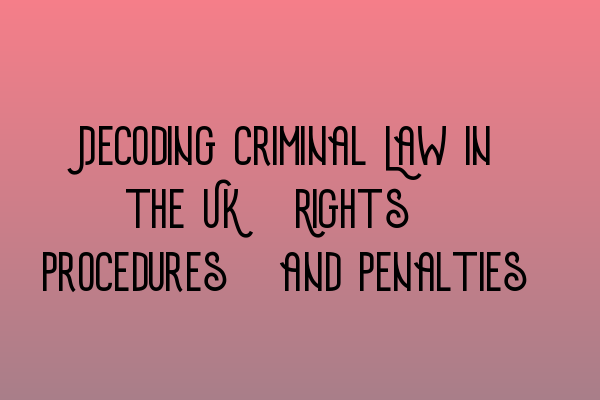Decoding Criminal Law in the UK: Rights, Procedures, and Penalties
When it comes to understanding criminal law in the UK, it can be a complex and daunting task. With its numerous rights, procedures, and penalties, navigating the legal system can seem like a maze. However, with the right knowledge and guidance, you can decipher the intricacies of criminal law and have a better understanding of your rights and obligations.
Know Your Rights
As a citizen of the UK, you have certain rights that are protected under the law. These rights are designed to ensure fairness and justice within the criminal justice system. One of the most fundamental rights is the right to a fair trial. This includes the right to legal representation, the right to remain silent, and the right to be presumed innocent until proven guilty.
If you find yourself facing criminal charges, it is crucial to exercise your right to legal representation. Hiring a knowledgeable and experienced criminal defence solicitor can significantly impact the outcome of your case. They will guide you through the legal process, build a strong defence strategy, and advocate for your rights throughout the proceedings.
The Criminal Procedure
Understanding the criminal procedure is essential to navigate the UK legal system effectively. The procedure begins with the investigation stage, where law enforcement authorities collect and analyze evidence. If there is enough evidence to support a criminal charge, the case will proceed to the next stage.
Once a charge has been made, a court appearance will be scheduled. At this stage, your legal representative will advise you on your plea, either guilty or not guilty. If you plead guilty, a sentencing hearing will take place, and the judge will determine the appropriate penalty.
If you enter a not guilty plea, the case will proceed to trial. During the trial, both the prosecution and the defence will present their evidence and arguments to a judge or a jury. It is crucial to have a skilled defence solicitor who can challenge the prosecution’s case, cross-examine witnesses, and present a compelling defence to prove your innocence.
After the trial, the judge or jury will deliver a verdict. If you are found guilty, a sentencing hearing will be held to determine the appropriate penalty. The penalties for criminal offences can range from fines and community service to imprisonment.
Understanding Penalties
Penalties for criminal offences in the UK vary depending on the nature and severity of the crime. They are designed to deter individuals from engaging in criminal activities and to maintain public safety. The range and severity of penalties reflect the seriousness of the offence committed.
For minor offences, the penalty may include a fine or community service. These penalties are typically imposed for non-violent crimes or first-time offenders. More serious offences, such as violent crimes or drug-related offences, can result in imprisonment. The length of the prison sentence will depend on the specific circumstances of the case.
In addition to fines and imprisonment, other penalties may include probation, restraining orders, and rehabilitation programs. These penalties aim to rehabilitate offenders and prevent them from reoffending.
Stay Informed and Prepared
Keeping up with updates and changes in UK criminal laws is crucial to staying informed and prepared. Legal regulations and precedents are constantly evolving, and it is essential to stay up to date with any revisions that may affect your rights and obligations.
Regularly attending workshops and seminars on criminal practice can help expand your expertise and keep you informed of the latest developments in the legal field. These events provide an opportunity to learn from industry experts, engage in discussions, and gain valuable insights into criminal law.
Workshops and Seminars on Criminal Practice: Expanding Your Expertise
Furthermore, joining a study group that focuses on SQE criminal law can enhance your learning experience and provide a supportive community to exchange ideas and discuss relevant topics. It allows you to collaborate with peers, share study materials, and gain different perspectives on criminal law.
Enhancing Your SQE Criminal Law Study Group Experience
Conclusion
Decoding criminal law in the UK may seem like a daunting task at first, but with the right knowledge and guidance, it becomes more manageable. Understanding your rights, the criminal procedure, and the potential penalties is crucial for navigating the legal system effectively.
By staying informed and prepared, attending relevant workshops and seminars, and engaging in a supportive study group, you can enhance your expertise and ensure you are well-prepared to handle criminal law matters.
Remember, seeking professional legal advice from an experienced criminal defence solicitor is essential to protect your rights and provide the best defence possible in criminal proceedings.
Updates in UK Criminal Laws: Staying Informed and Prepared
